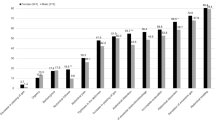Abstract
The purpose of this study was to investigate the relationship between aspects of the feminine gender role and modes of illness behavior in patients with irritable bowel syndrome (IBS). Fifty IBS patients (34 women and 16 men) completed the Personal Attributes Questionnaire (PAQ), which assesses aspects of gender role, and the Illness Behavior Questionnaire (IBQ), which assesses components of illness behavior. The Communal Femininity subscale of the PAQ, which is characterized by traits of servility and subordination, showed a significant positive correlation with the Disease Conviction subscale of the IBQ, which is characterized by symptom preoccupation and rejection of physician reassurance (r = .55; p < .001). The Communal Femininity subscale of the PAQ also correlated positively with the General Hypochondriasis subscale of the IBQ, which is characterized by a high level of anxiety over one's state of health (r = .55; p < .001). These results suggest that characteristics of the feminine gender role, such as the nurturing of others before oneself, may influence the experience of physical symptoms by contributing to a heightened focus on physiological cues and by increasing levels of psychosocial stress.
Similar content being viewed by others
REFERENCES
Ali, A., & Toner B. B. (1996). Sexual abuse and self-blame in women with irritable bowel syndrome (Abstract). Psychosomatic Medicine, 58(1), 66.
Ali, A., & Toner B. B. (1997a). Gender-related variables in the conceptualization of irritable bowel syndrome (Abstract). Canadian Psychology, 38(2), 5.
Ali, A., & Toner B. B. (1997b). Self-silencing and its psychosocial correlates in women with irritable bowel syndrome. Paper presented at the 9th Annual Meeting of the American Psychological Society, Washington, D.C.
Barsky, A. J., Geringer, E., & Wool, C. A. (1988). A cognitive-educational treatment for hypochondriasis. General Hospital Psychiatry, 10, 322–327.
Drossman, D. A. (1994). Irritable bowel syndrome. The Gastroenterologist, 2(4), 315–326.
Drossman, D. A., Creed, F. A., Fava, G. A., Olden, K. W., Patrick, D. L., Toner, B. B., & Whitehead, W. E. (1995). Psychosocial aspects of the functional gastrointestinal disorders. Gastroenterology International, 8(2), 47–90.
Drossman, D. A., McKee, D. C., & Sandler, R. S. (1988). Psychosocial factors in the irritable bowel syndrome: A multivariate study of patients and non-patients with irritable bowel syndrome. Gastroenterology, 95, 701–708.
Kirmayer, L. J. & Robbins, J. M. (1991). Functional somatic syndromes. In L.J. Kirmayer & J.M. Robbins (Eds.), Current Concepts of Somatization: Research and Clinical Perspectives (pp. 79–105). Washington, DC: American Psychiatric Press.
Latimer, P. (1983). Functional gastrointestinal disorders: A behavioral medicine approach. New York: Springer Publishing Co.
Lips, H. M. (1993). Sex and gender: An introduction. Mountainview: Mayfield.
Liss, J. L., Alpers, D., & Woodruff, R. A. (1973). The irritable colon syndrome and psychiatric illness. Disease of the Nervous System, 34, 151–157.
Litt, M. D., & Baker, L. H. (1987). Cognitive-behavioral interventions for irritable bowel syndrome. Journal of Clinical Gastroenterology, 2, 208–211.
Pilowsky, I., & Spence, N.D. (1975). Patterns of illness behavior in patients with intractable pain. Journal of Psychosomatic Research, 19, 279–287.
Spence, J. T., Helmreich, R. L., & Stapp, J. (1974). The Personal Attributes Questionnaire: A measure of sex-role stereotypes and masculinity-femininity. JSAS Catalogue of Selected Documents in Psychology, 4, 43–44.
Thompson, W. G., Dotevall, G., Drossman, D. A., Heaton, K. W., & Kruis, W. (1989). Irritable bowel syndrome: Guidelines for diagnosis. Gastroenterology International, 2, 92–95.
Toner, B. B. (1994). Cognitive-behavioral treatment of functional somatic syndromes: Integrating gender issues. Cognitive and Behavioral Practice, 1, 157–178.
Toner, B. B., Garfinkel, P. E., & Jeejeebhoy, K. N. (1988). Psychological factors in irritable bowel syndrome. Canadian Journal of Psychiatry, 35, 158–161.
Toner, B. B., Garfinkel, P. E., Jeejeebhoy, K. N., Scher, H. B., Shulhan, D., & DiGasbarro, I. (1990). Self-schema in irritable bowel syndrome. Psychosomatic Medicine, 52, 149–155.
Walker, E. A., Katon, W., Jemelka, R. P. & Roy-Burne, P. P. (1992). Comorbidity of gastrointestinal complaints, depression and anxiety in the Epidemiologic Catchment Aeta (ECA) Study. American Journal of Medicine, 92, 26S–30S.
Worell, J., & Remer, P. (1992). Feminist perspectives in therapy: An empowerment model for women. Toronto: Wiley and Sons.
Author information
Authors and Affiliations
Rights and permissions
About this article
Cite this article
Ali, A., Richardson, D.C. & Toner, B.B. Feminine Gender Role and Illness Behavior in Irritable Bowel Syndrome. Journal of Gender, Culture, and Health 3, 59–65 (1998). https://doi.org/10.1023/A:1023250332634
Issue Date:
DOI: https://doi.org/10.1023/A:1023250332634




